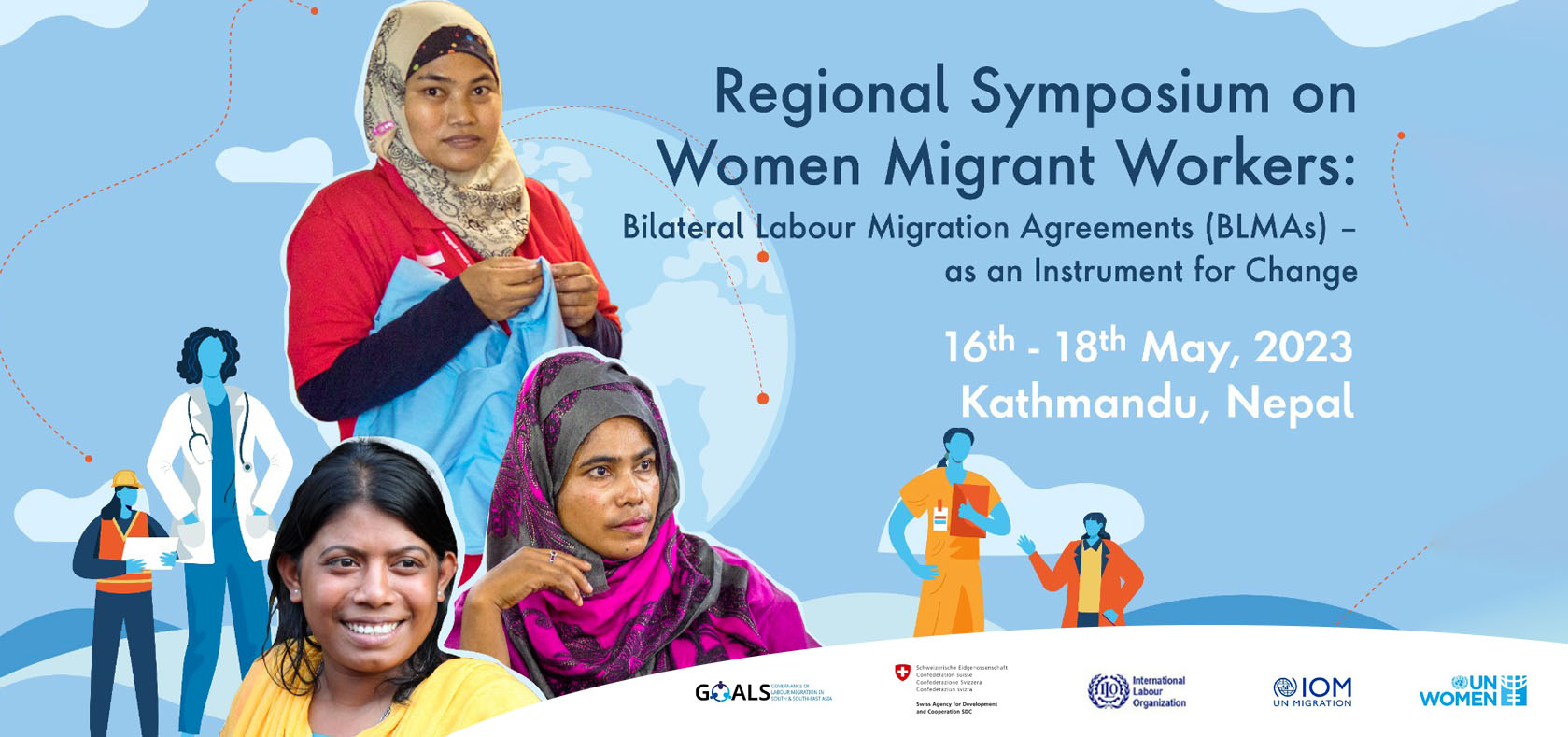Strengthening bilateral labour migration agreements to protect the rights of women migrant workers
Date:
[Press release]
[For immediate release]

Kathmandu, Nepal — The Regional Symposium on Women Migrant Workers: Bilateral Labour Migration Agreements (BLMAs) as an Instrument for Change took place from 16 to 18 May 2023. The symposium aimed to advance gender-responsive migration governance and promote the safety, decent working conditions, and well-being of women migrant workers across all stages of the migration process.
In his opening remarks, the Secretary of the Ministry of Labour, Employment and Social Security, Government of Nepal, Eaknarayan Aryal, expressed hope for the symposium to contribute to the better formulation, implementation, monitoring and evaluation of BLMAs as a tool to ensure safe, regular, orderly migration for women migrant workers.
The symposium highlighted the numerous risks and challenges faced by South Asian women seeking employment abroad and the collaborative efforts of governments to safeguard their rights. Numan Özcan, Director of the ILO Country Office for Nepal, echoed the participants’ opinions, stating that rights-based and gender-responsive BLMAs could facilitate orderly and safe migration, regulate recruitment practices, promote decent working and living conditions and provide a framework for social protection and access to justice.
To effectively utilise rights-based and gender-responsive BLMAs as a tool to provide protection for women migrant workers, it is crucial to engage relevant stakeholders, especially those representing women workers. “Labour migration in South Asia is a lifeline for development, an equality imperative, and an opportunity for women's empowerment. However, targeted support is needed to address the specific needs and concerns of women migrant workers,” added Navanita Sinha, Head of UN Women Nepal Country Office a.i.
The symposium brought together more than 40 stakeholders from South Asian countries (Bangladesh, India, Nepal, Pakistan, and Sri Lanka), including representatives from governments, workers’ and employers’ organizations, and civil society organizations, to exchange promising practices and discuss women’s experiences of labour migration.
Affirming the importance of human rights-based and gender-responsive BLMAs as a tool for advancing decent work, there was a strong call to include provisions addressing the needs and vulnerabilities of women migrant workers with regard to equality and non-discrimination, violence and harassment, access to healthcare and social protection including maternity protection, and access to justice.
Many women migrant workers are concentrated in occupations with low pay and poor working conditions, such as domestic work, and might be excluded from the protection of labour laws. The consensus amongst participants emphasized the need for government action to combat discrimination, ensure equal opportunities, and protect the rights of women migrant workers. These recommendations are vital inputs for ongoing policy dialogues at national and regional levels, including the Colombo Process and Abu Dhabi Dialogue.
The event showcased the Philippine-Germany Bilateral Labour Agreement on Filipino Nurses Deployment to Germany as a powerful example of a successful BLMA practice that prioritizes women's labour migration by providing equal treatment through social protection, adequate accommodation, language and professional training for candidates, and setting up a dispute settlement mechanism, as well as a Joint Committee comprising of governmental and non-governmental actors including trade unions.
The symposium was the first of its kind in South Asia, and it was jointly held by the International Labour Organization (ILO) and UN Women in collaboration with the International Organization for Migration (IOM). It was held within the framework of the joint ILO-IOM-UN Women programme “Governance of Labour Migration in South and South-East Asia” (GOALS), and the ILO Migrants Rights and Decent Work (MIRIDEW) project supported by the Swiss Agency for Development and Cooperation.
For more information, please contact:
Amish Karki
ILO Decent Work Team for South Asia and Country Office for India
e: [ Click to reveal ]
Geertrui Lanneau
IOM, Regional Office for Asia and the Pacific
e: [ Click to reveal ]
Nansiri Iamsuk
UN Women Regional Office for Asia and the Pacific
e: [ Click to reveal ]